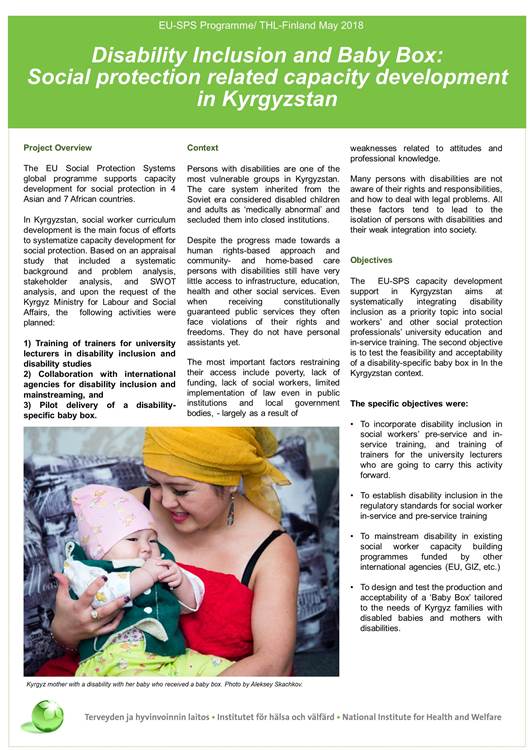EU-SPS Capacity development work
Download our guidance note on Kyrgyzstan (pdf 688KB)
Focus on the curriculum development and training of social workers on disability inclusion
The EU-SPS capacity development work in Kyrgyzstan focused on systematizing the capacity development of local government social workers and central government social protection professionals, especially in the area of inclusion of disabled children. This was done through cooperation with the Kyrgyz University of Humanities in Bishkek and four local universities in Osh. EU-SPS/Finland contributed disability inclusion expertise in support of the TA-component of the large EU social protection budget support project. The programme also piloted the feasibility of disability-tailored maternity packages addressed to mothers with disabilities, or mothers with new-borns with disabilities.
Context
Official data on disability is inadequate in Kyrgyzstan. Based on official statistics, persons with disabilities in Kyrgyzstan represent 2.8% of the country’s total population. According to official statistics from 2016, there are 6.1 million people in the Kyrgyz Republic, of which 172 000 are people with disabilities and 28 000 are children with disabilities under the age of 18. However, according to WHO’s World Report on Disability (2011), 15% of the population can be expected to have disabilities.
The Constitution of the Kyrgyz Republic guarantees social support and protection to all its citizens. Article 16 of the Constitution states the principle that no one shall be subject to discrimination by gender, disability, age, education or other circumstances. In Kyrgyzstan there is a combination of general and special laws and other norms regarding the rights of people with disabilities. However, there are gaps in the legislation.
During the Soviet period in Kyrgyzstan institutionalization was the mainstream approach for care and rehabilitation of children and adults with disabilities. In line with the principles of the UN Convention on the Rights of Persons with Disabilities (CRPD), the official Government policy now prefers community based care.
However, the legacy of the Soviet period dies hard. Families are often ashamed of their disabled children and hide them at home. Social workers play an important role in informing families about their legal rights and benefits, and in referring the disabled children and their families to the other public services they have a right to. Therefore, there is a need for more training for the social work professionals of Kyrgyzstan on the modern ideas and practices of disability inclusion.
Our approach
The EU-SPS work protected and promoted the rights of persons with disabilities by developing the professional knowledge, skills and attitudes of social workers and other social protection professionals in Kyrgyzstan. This was done through social work curriculum development at relevant national universities. Through a market consultation process Abilis Consulting was selected as the main partner for the capacity development work in Kyrgyzstan. The company is owned by Abilis Foundation, a Finland-based disability support organization owned and controlled by Finnish disabled people’s organizations (DPOs). Abilis partnered at the country level closely with a Kyrgyz DPO by the name Ravenstvo.
The overall objective for the EU-SPS work in Kyrgyzstan was to advance the rights of persons with disabilities and to enhance disability inclusion in social workers’ capacity building and training in Kyrgyzstan. More specifically, the work aimed to:
1) Incorporate disability inclusion in pre-service curricula of students of social work, and in the in-service training programmes of social workers
The programme aimed to develop, test and integrate disability inclusion related topics into the curriculum used by Kyrgyz universities to train future generations of social workers. Disability inclusion module tailored for the Kyrgyz context has been developed and tested, and university teachers trained in Training of Trainers sessions both in Bishkek and in Osh. The training materials on disability inclusion will be incorporated in the training programmes of social workers.
Read about the training of trainers
See the training of trainers materials
2) Design and test the productions and acceptability of a ‘Baby Box’ tailored to the needs of Kyrgyz families with disabled babies or disabled parents
EU-SPS also supported the design, manufacturing and action research testing of a disability-tailored maternity package (baby box), to be provided to families with babies or parents with disabilities. 100 maternity packages including the contents, were produced by a group of local Kyrgyz women with disabilities. Thus, EU-SPS also promoted employment and income generation opportunities for low-income women with disabilities.
Read more about the disability-tailored maternity package pilot here.
3) Disability expertise to the EU Budget Support Technical Assistance
EU-SPS made available Finnish experts of disability inclusion to work also with the other larger development projects in Kyrgyzstan. The EU-SPS intervention aimed at mainstreaming disability inclusion also into the curricula of the project-specific trainings that the EU Budget Support TA-project and other larger development projects provide to Kyrgyz social protection professionals.
More information and contact:
For more information on the EU-SPS/Finland capacity development work in Kyrgyz Republic, please contact Timo Voipio: [email protected]




